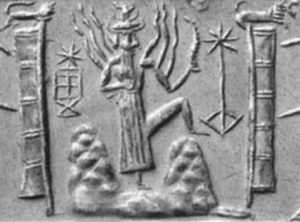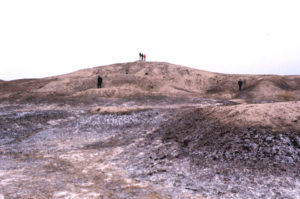The Sun God (Shamash / Utu) Tablet
britishmuseum.org/research/collection_online/collection_object_details.aspx?objectId=282224&partId=1
(Texts: All Artifacts, Color Coding, & Writings in Bold Type With Italics Inside Parenthesis, are Added by Editor R. Brown, not the Authors, Translators, or Publishers!)
(gods in blue …mixed-breed demigods in teal…)
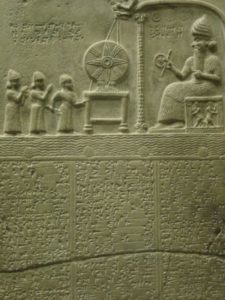 (Babylonian Sun God Tablet, Shamash)
(Babylonian Sun God Tablet, Shamash)
(Utu / Shamash seated, Enlil above pulling strings on “wheel of justice”, Babylonian King Nabu-aplu-iddina being led by the priest Nabu-nadin-shum and the goddess Aa into the presence of the Sun-god, who is seated within Ebabbara) OR MY VIEW: (Babylonian King Nabu-aplu-iddina being led by Hendursaga & Aia, son & spouse to Shamash)
(1) Image of Shamash (Utu), the great Lord
(2) who dwells in Ebabbara (Utu’s ziggurat residence in Sippar),
(3) which is in Sippar.
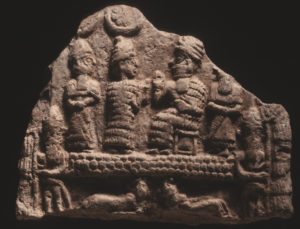 (Utu, twin sister Inanna, father Nannar / Sin, & damaged brother Papsukal)
(Utu, twin sister Inanna, father Nannar / Sin, & damaged brother Papsukal)
(1) Sin, Shamash and Ishtar (Inanna) are set over against the heavenly ocean
(2) within the divine judge.
Animal Horned Headdress of Shamash; Rod of Do.
Inscription Translation
Column One
(Utu: Utu’s patron city Sippar with his ziggurat residence E-babbara)
(1) Shamash, the great lord,
(2) who dwells in Ebabbara,
(3) which is in Sippar,
(4) which during the troubles
(5) and disorders in Akkad
(6) the Sutu, the evil foe,
(7) had overthrown,
(8) and they had destroyed the sculptured reliefs,-
(9) his law was forgotten,
(10) his figure and his insignia
(11) had disappeared,
(12) and none beheld them.
(13) Simmash-Shipak, king of Babylon,
(14) sought for his figure,
(15) but he did not reveal himself to him..
(16) His image and his insignia
(17) he did not find,
(18) but the enclosure which is before Shamash
(19) he erected,
(20) and he established his regular offerings,
(21) and Ekur-shum-ushabshi,
(22) the priest of Sippar,
(23) the seer, he settled (there).
(24) During the distress and famine
(25) under Kashshu-nadin-akhi, the king,
(26) those regular offerings
(27) were discontinued,
(28) and the drink-offering ceased.
(29) In the reign of Eulmash-shakin-shum, the king,
(30) Ekur-shum-ushabshi,
(31) the priest of Sippar, the seer,
Column two
1) went before the king, his lord,
(2) and ” The temple-offerings of Shamash
(3) have ceased,” he said;
(4) and one ‘ka’ of flour and one ‘ka’ of sesame wine
(5) the allowance of the director of Esagila (Marduk’s ziggurat residence),
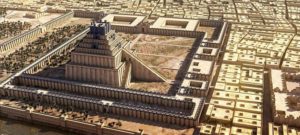 (E-sagila, Marduk’s ziggurat residence in Babylon)
(E-sagila, Marduk’s ziggurat residence in Babylon)
(6) from the temple-offerings of Bel
(7) he appointed for Shamash,
(8) and to Ekur-shum-ushabshi,
(9) the priest of Sippar,
(10) the seer, he granted them.
(11) A garden in the district
(12) of Alu-eshshu,
(13) which is in Babylon,
(14) he gave to Shamash,
(15) and to Ekur-shum-ushabshi,
(16) the priest of Sippar, the seer,
(17) he entrusted it. At a later time
(18) Nabu-aplu-iddina,
(19) the king of Babylon,
(20) the elect of Marduk,
(21) the beloved of Anu and Ea,
(22) who rejoices the heart of Sarpanitu (Marduk‘s spouse),
(23) the valiant hero
(24) who for kingship is well fitted,
(25) who bears a terrible bow,
(26) who overthrew the evil foe,
(27) the Sutu,
(28) whose sin was great,
(29) whom to avenge
(30) Akkad, to make cities habitable,
Column Three:
(1) to found shrines,
(2) to fashion sculptured reliefs,
(3) to preserve statutes
(4) and ordinances,
(5) to establish regular offerings,
(6) to increase free-will offerings,
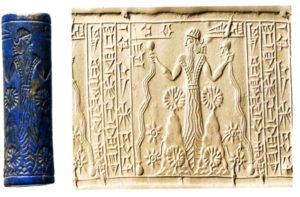 (Marduk, lord over Babylon, & later Egypt)
(Marduk, lord over Babylon, & later Egypt)
(7) the great lord Marduk
(8) with a righteous sceptre
(9) to undertake the rule of the peoples
(10) had invested,-
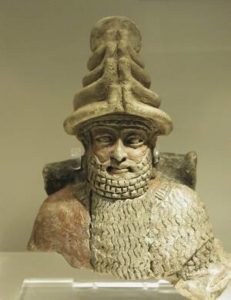 (Utu / Shamash, son to Nannar & Ningal)
(Utu / Shamash, son to Nannar & Ningal)
(11) Shamash, the great lord,
(12) who for many days
(13) with Akkad had been angry
(14) and had averted his neck,
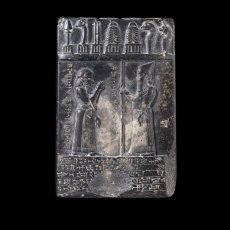 (land granted by King Nabu-aplu-iddina)
(land granted by King Nabu-aplu-iddina)
(15) in the reign of Nabu-aplu-iddina,
(16) the king of Babylon,
(17) had mercy
(18) and turned again his countenance.
(19) A model of his image,
(20) fashioned in clay,
(21) his figure and his insignia,
(22) on the opposite side
(23) of the Euphrates,
(24) on the western bank,
(25) were found,
(26) and Nabu-nadin-shum,
(27) the priest of Sippar, the seer,
(28) of the seed of Ekur-shum-ushabshi,
(29) the priest of Sippar, the seer,
(30) that model of the image
Column Four
(1) to Nabu-aplu-iddina,
(2) the king, his lord, showed,
(3) and Nabu-aplu-iddina,
(4) king of Babylon,
(5) who the fashioning of such an image
(6) had given him as a command
(7) and had entrusted to him,
(8) beheld that image
(9) and his countenance was glad
(10) and joyful was
(11) his spirit.
(12) To fashion that image
(13) he directed his attention,
(14) and through the wisdom of Ea (Enki),
(15) with the craft of Nin-igi-nangar-bu (unidentified),
(16) Gushkin-banda (unidentified),
(17) Ninkurra (Enki’s daughter), and Nin-zadim (unidentified)
(18) with sumptuous gold
(19) and bright lapis-lazuli
(20) the image of Shamash, the great lord,
(21) he carefully prepared.
(22) With the rite of purification
(23) of Ea and (son) Marduk
(24) before Shamash
(25) in Ekarzagina,
(26) which is on the bank of the Euphrates,
(27) he washed his mouth,
(28) and he took up his dwelling (there).
(29) Offerings, the desire of the heart,
(30) consisting of huge oxen
(31) and fat sheep, pure
(32) and of great size, he offered,
(33) and with honey, wine and flour
(34) he made the storehouses to abound.
(35) At that time
(36) the heart of Nabu-aplu-iddina,
(37) the king of Babylon,
(38) rejoiced,
(39) his countenance was bright;
(40) upon Nabu-nadin-shum,
(41) the priest of Sippar, the seer,
(42) he turned his gaze.
(43) With his bright gaze
(44) and shining countenance
(45) and gracious eyes joyfully
(46) he looked upon him;
(47) and one ‘ka’ of flour and one ‘ka’ of sesame-wine,
(48) the ancient dues of Shamash,
(49) together with the garden
(50) which Eulmash-shakin-shum, the king,
(51) to Ekur-shum-ushabshi,
(52) the priest of Sippar, the seer,
(53) had presented (he restored);
(54) and from the flour, sesame-wine,
(55) syrup,1 flesh of oxen,
Column Five
(1) flesh of sheep, fish,
(2) and garden-produce, which anew
(3) Nabu-aplu-iddina,
(4) the king of Babylon,
(5) for Shamash, Aa (Aia / Aya, Utu’s spouse),
(6) and Bunene (probably Hendursaga, son to Utu & Aia)
(7) appointed, the share pertaining to the king
(8) (he set apart for) the priest’s sustenance. Among the sheep,
(9) the royal offerings for the whole year,
(10) the loins, the skin,
(11) the hinder-part, the muscles,
(12) half the abdominal organs,
(13) half the thoracic organs,
(14) two knuckle-bones,
(15) and a vessel of meat-broth,
(16) from the offerings of cattle and sheep
(17) of the sacrificial priest
(18) (were divided) in accordance with the following list:
(19) from five allowances
(21) two allowances in flour,
(22) sesame-wine, syrup,
(23) flesh of oxen, flesh of sheep,
(24) fish, and garden-produce,
(25) (were assigned to) the company of “dagger-bearers,”
(26) and furnishings therewith
(27) corresponding to (the share of) two . . . . . -officials.
(28) From the temple-dues, be they small
(29) or great
(30) by the decree of the city, the flour
(31) of the sacrificial priest, and all
(32) the tribute
(33) of Ebabbara
(34) there is,
(35) the share pertaining to the king
(36) is for the priest’s sustenance,
(37) and two allowances
(38) corresponding to (the share of) two . . . . . -officials.
(39) Festal garments of every kind,
(40) for Shamash, Aa (Aia)
(41) and Bunene (probably Hendursaga) (he presented), viz.,
(42)…..a ‘pulkhu’-garment,
(43) a ‘karbit’-ga.rment,
(44) a ‘sheriʾtu’-garment,
(45) a laced garment,
(46) a ‘nibikku’-garment,
(47) light purple wool,
(48) dark purple wool,
(49) a great ‘karbit’-garment,
(50) and the ‘telit’ of the sacrificial priest;
(51) for the seventh day of Nisan
(52) a ‘sheriʾtu’-garment;
(53) for tne tenth day of Iyyar
(54) a ‘sheriʾtu’-garment;
(55) for the third day of Elul, a ‘karbit-garment;
Column Six
(1) for the seventh day of Tisri, a ‘karbit’-garment;
(2) for the fifteenth day of Marcheswan
(3) a ‘sheriʾtu’-garment;
(4) for the fifteenth day of Adar a ‘karbit’-garment;
(5) in all, six festal garments for the whole year,
(6) the gift of the king
(7) for Shamash, Aa
(8) and Bunene,
(9) Nabu-aplu-iddina,
(10) king of Babylon, presented
(11) to Nabu-nadin-shum,
(12) the priest of Sippar, the seer,
(13) his servant;
(14) and that there should be no suit for recovery,
(15) he sealed it
(16) and presented it for ever.
(17) At the sealing of this document
(18) Marduk-shum-ukin,
(19) the son of Khabban, the priest,
(20) Ittabshi-ilu,
(21) the son of Ea-rimanni, the minister,
(22) Marduk-tabik-zeri,
(23) the son of Tubalat-Ishtar, the officer,
(24) and Marduk-balatsu-ikbi,
(25) the son of Arad-Ea,
(26) the governor of the province, are present.
(27) At Babylon, the twentieth day of the month Nisan,
(28) the thirty-first year of Nabu-aplu-iddina,
(29) king of Babylon.
(30) Copy of the king’s sealed document
(31) of administration.
(32) Whosoever in the future
(33) into the palace as ruler
(34) shall enter,
(35) and the gift of King
(36) Nabu-aplu-iddina
(37) shall annul,
(38) or shall present it to another,
(39) or shall make deductions from the allowances,
(40) or shall reckon it as the property of the governor,
(41) or shall appropriate it for himself,
(42) or by any evil act
(43) this tablet
(44) shall destroy,
(45) as for that man,
(46) by the command of Shamash, Aa
(47) and Bunene,
(48) lords of the decision,
(49) the great gods,
(50) may his name perish,
(51) may his seed be destroyed,
(52) through oppression and hunger
(53) may his life come to an end,
(54) may his corpse be cast aside
(55) and may he have no burial!
